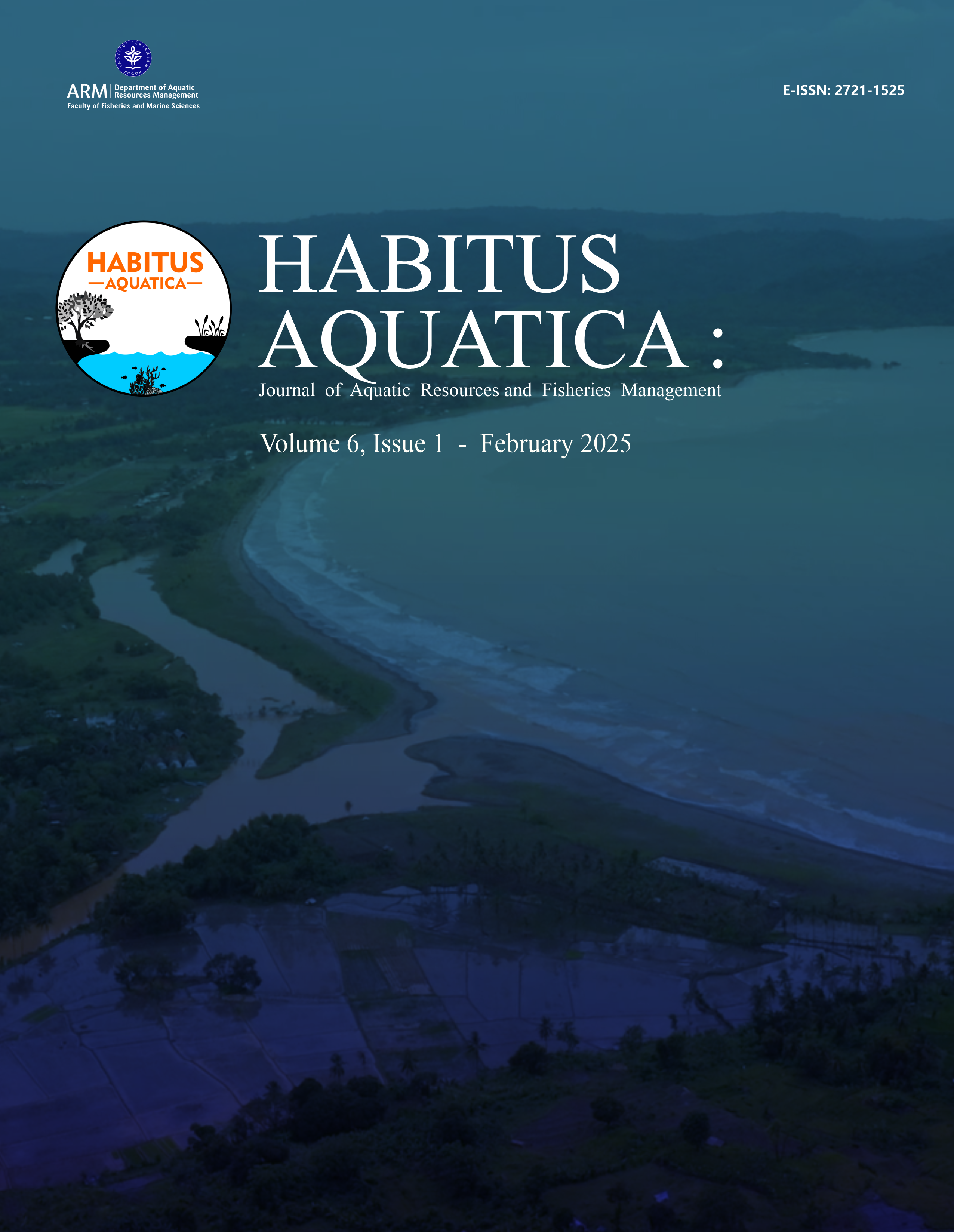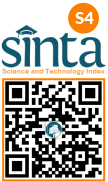The Community Perception of Waste Management on The Belawan Coast, North Sumatra
Persepsi Masyarakat Terhadap Pengelolaan Sampah di Pesisir Belawan, Sumatera Utara
Abstract
The abundant natural potential in the Belawan coastal area has great opportunities for the development of various activities. In addition, the Belawan coastal area is also vulnerable to high pollution, especially because of its role in supporting the regional economy through sectors such as tourism, fisheries, transportation, and industry. Effective waste management is a special concern of the government along with maximum efforts in developing economic potential. Waste has become a global problem, especially in Indonesia with its increasing population growth. This research aims to analyze strategies for controlling pollution from waste in the Belawan coastal area. The method used is a Likert Scale to evaluate the community's perception of the issue of waste problems. On the economic aspect, the community assessed that waste management has not had a significant impact, but on the social aspect, waste management was rated positively with the highest score reaching 68,80 which was obtained on waste management activities that increased fraternal ties. The problem of low sanitation awareness is the main obstacle that requires solutions based on community participation in waste management.
Downloads
References
Ankesa HA, Amanah S, Asngari PS. 2016. Partisipasi Kelompok Perempuan Peduli Lingkungan dalam Penanganan Sampah di Sub DAS Cikapundung Jawa Barat. Jurnal Penyuluhan. 12(2):105–113.
Baedowy M, Sumarwan U, Setiawan I. 2020. Factors Influencing Consumer Intention and Decision to Purchase Plastic Waste Recycle Machine. Indonesia Jurnal of Busisness Entreprenuership. 6(2):163–173. doi:10.17358/ijbe.6.2.163.
BPS. 2021. Kecamatan Medan Belawan dalam Angka.
Djuwendah D. 2005. Keragaan Sosial Ekonomi Usaha Daur Ulang dan Pengomposan Sampah di Kotamadya Bandung. Sosiohumaniora. 7(3):248–263.
Hasibuan NH, Suryati I, Leonardo R, Risky A, Ageng P, Addauwiyah R. 2020. Analisa Jenis, Bentuk dan Kelimpahan Mikroplastik Di Sungai Sei Sikambing Medan. Jurnal Sains dan Teknologi Jurnal Keilmuan dan Aplikasi Teknologi Industri. 20(2):108. doi:10.36275/stsp.v20i2.270.
Indrawati D. 2011. Upaya Pengendalian Pencemaran Sungai yang diakibatkan oleh Sampah. Indonesian Journal Of Urban And Environmental Technology. 5(6):185–192.
Jambeck JR, Geyer R, Wilcox C, Siegler TR, Perryman M, Andrady A, Narayan R, Law KL. 2015. Plastic waste inputs from land into the ocean. Science. 347(6223):768–771.
Mahda RH. Posumah J, Laloma A. 2016. Perilaku Masyarakat Dalam Membuang Sampah Di Tempat Penampungan Sementara (Tps) Di Kecamatan Pontianak Barat Kota Pontianak. Jurnal Teknologi Lingkungan Lahan Basah. 4(1):84–90. doi:10.26418/jtllb.v4i1.15633.
Mukherji SB, Sekiyama M, Mino T, Chaturvedi B. 2016. Resident Knowledge And Willingness To Engage In Waste Management In Delhi, India. Sustainability. 8:1–14. doi.Org/10.3390/Su8101065.
Norival A. 2018. Perilaku Masyarakat di Bagian Tengah Batang Ino terhadap Sampah di Nagari Salimpaung Kecamatan Salimpaung Kabupaten Tanah Datar. Jurnal Buana. 2(1):262–273.
Oosterbeek L, Scheunemann I, Santos L. 2013. Water resources and human behaviour: an integrated landscape management perspective. Cadernos do LEPAARQ (UFPEL). 10(20):227–244.
Peng G, Zhu B, Yang D, Su L, Shi H, Li D. 2017. Microplastics in sediments of the Changjiang Estuary, China. Environ. Pollut. 225:283–290.
Riduwan. 2009. Skala Pengukuran Variable-Variabel Penelitian. Bandung: Alfabeta.
Sevilla CG. 2007. Research Methods. Quezon City: Rex Printing Company.
Siswanto SG. 2018. [Tesis Diploma] Pengaruh kondisi sosial dan pengetahuan lingkungan ibu-ibu rumah tangga terhadap pengelolaan sampah rumah tangga di Kecamatan Blimbing Kota Malang. Malang: Universitas Negeri Malang.
Solihin MM, Muljono P, Sadono D. 2019. Partisipasi Ibu Rumah Tangga dalam Pengelolaan Sampah Melalui Bank Sampah di Desa Ragajaya, Bojonggede-Bogor Jawa Barat. Jurnal Ilmu Lingkungan. 17(3):388–398.
Sugiyono PD. 2009. Metode Penelitian Kuantitatif Kualitatif dan R&D. Bandung: CV.
Sulistiyani AT, Wulandari Y. 2017. Proses Pemberdayaan Masyarakat Desa Sitimulyo, Kecamatan Piyungan, Kabupaten Bantul dalam Pembentukan kelompok Pengelola sampah Mandiri. Indonesia Jurnal of Community Engagment. 2 No. 02. Universitas Gajah Mada.
Utama AR, Dewi ZP. 2020. Pengaruh Faktor Sosial Ekonomi Terhadap Perilaku Masyarakat dalam Pengelolaan Sampah Pedesaan di Provinsi Sumatera Barat. Jurnal Kajian Ekonomi dan Pembangunan. 2(1):53–60.
Yusuf M. 2019. Partisipasi Masyarakat dalam Pembangunan di Gang Tanjung Kelurahan Sungai Pinang Luar Kota Samarinda. eJournal Ilmu Pemerintahan. 7(4):1849–1860.
Zulkarnaen. 2017. [Skripsi] Identifikasi Sampah Laut (Marine Debris) Di Pantai Bodia Kecamatan Galesong, Pantai Karama Kecamatan Galesong Utara, Dan Pantai Mandi Kecamatan Galesong Selatan. Makassar: Universitas Hasanuddin.
Copyright (c) 2025 Habitus Aquatica

This work is licensed under a Creative Commons Attribution-ShareAlike 4.0 International License.
Authors submitting manuscripts should understand and agree that copyright of manuscripts of the article shall be assigned/transferred to Habitus Aquatica Journal. This work is licensed under a Creative Commons Attribution-ShareAlike 4.0 International License (CC BY-SA). Therefore, Authors and Readers are permitted to share — copy and redistribute the material in any medium or format, and adapt — remix, transform, and build upon the material for any purpose. However, they must give appropriate credit, provide a link to the license, and indicate if changes were made. If you remix, transform or build upon the material, you must distribute your contributions under the same license as the original.


















